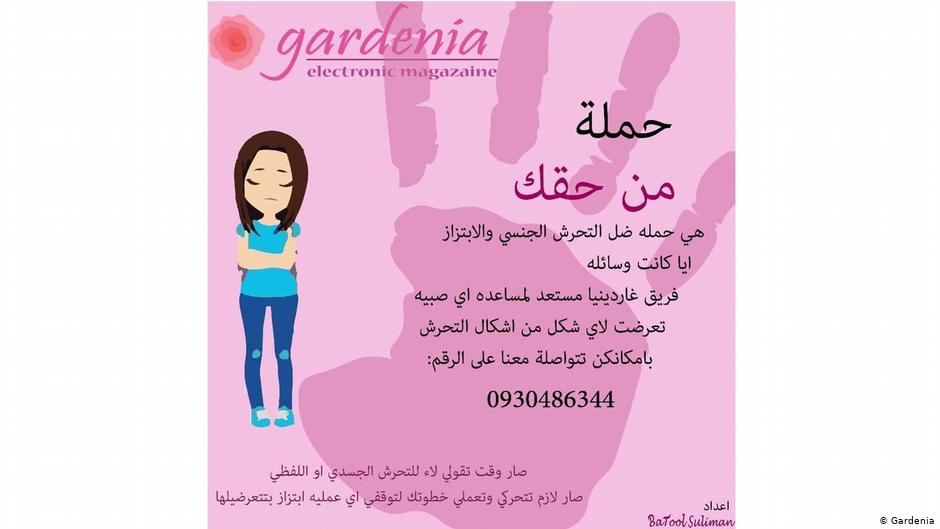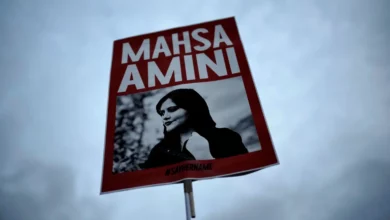
Like most girls her age, 19-year-old Nour* was blinded by love for her boyfriend. For six months, Nour felt she was living a fairy tale until he asked her for nude pictures.
“In the beginning I refused. But after multiple requests and promises that he will never betray my trust, I gave in and sent him a couple of pictures,” she says.
Soon afterwards he started asking for more. “This time it wasn’t just pictures. When I made it clear that I will never accept this, he started threatening to send the pictures to my family. If my family discovers I sent such pictures, they will disown me,” she says.
Taboos prevalent in Syrian society
In Syria, premarital sex or any acts of that sort are a source of disgrace and shame, especially for women.
Nour didn’t know what to do until a friend of hers told her about the Gardenia** initiative in late 2019.
Syrian doctor Zainab AlAassi established Gardenia in 2017 as an initiative to empower women by raising awareness about women-related issues. In 2019, Gardenia launched the “It Is Your Right” campaign to encourage young women who have been subjected to sexual exploitation and harassment to break their silence.

Alassi says messages from a sextortion victim prompted her to start the Gardenia campaign.
To date, 1,100 Syrian women have come forward with their stories, the campaign says. All these cases had one thing in common: “Fear,” says Dr AlAassi. “Fear of parents; fear of society.” This is one of the biggest challenges for our campaign too,” she adds.
Support and advice for victims
The campaign tries to help sextortion victims at both the legal and socio-psychological levels and collaborates with a number of lawyers to provide free-of-charge legal consultations.
“We helped around 90% of the cases to file a lawsuit. In most cases, the defendant backs down once he knows that an official complaint has been filed with the police,” AlAassi says.
According to Syrian criminal law, extortion is punishable by up to two years in prison in addition to a fine. This penalty is doubled if the crime is carried out online, according to laws regulating online communication and countering cyber crimes. Moreover, online material violating privacy is punishable by a prison term ranging from one to six months, in addition to a fine between 100,000-500,000 Syrian liras (€65 – €325,50).
After getting legal advice through the campaign, Nour confronted her ex-boyfriend and told him she would take him to court if he carried out his threat. “Once he knew I was serious about filing a lawsuit, he stopped and disappeared from my life,” she says.
Mental scars remain
But the mental and emotional effect of the experience does not just disappear. Therefore, Gardenia’s campaign continues to work with these survivors through sessions given by a network of volunteer psychologists and therapists to help these women go back to their normal life.
Gardenia is not the only non-government initiative in Damascus that is helping sextortion victims from different parts of Syria.
Bara Altrn, a lawyer, also offers legal advice to women who’ve been subject to sexual threats online.
“It all started with a posting about legal provisions that protect women against sextortion on social media two years ago after observing several cases of sextortion happening to people around me,” she says.
Afterwards, women started to approach her asking for help and that’s when she started offering legal consultations for sextortion victims for free, she says.

Damascus’ old court complex in Al-Hamidiyah, where special courts for electronic crimes look into sextortion lawsuits.
Altrn doesn’t keep count of the women she helps but says there are many. “I have filed three lawsuits myself on behalf of the victims. There are others whom I know that have referred the issue to court after consulting me, but I wasn’t their lawyer,” she says. “Interestingly, once the case goes to court, the defendant backs down and tries to reach a solution outside court.”
Altrn agrees that fear of their parents’ reaction is the main concern for all the young victims who contact her.
She recalls an incident when a university student in Homs Province took her own life a few months ago after being threatened by her boyfriend to publish nude pictures of her.
“Unfortunately, Syrian society blames the victim of sextortion. They believe she is the one who agreed to share these pictures and, hence, she deserves what happens to her,” Altrn says.
Social media, COVID-19 exacerbate the situation
Sexual harassment and sextortion are not new to Syrian society. But the spread of social media and 10 years of conflict have made it easier for harassers to target their victims for sex, money or both.
COVID-19 has also made things worse, forcing people to stay home and, hence, spend more time online, which has led to an increase in such cases on social media.

Sham Alsahhar says through their campaign they’ve been able to shut down a number of Facebook accounts that target women.
Twenty-year-old Sham Alsahhar faced online sexual harassment several times, which prompted her and three of her female friends to launch the “No to Electronic Sexual Harassment” group in September.
The group’s main goal is to shut down Facebook accounts that are harassing women. The group does this by asking its members to report these accounts.
“We came across many cases, in which the Facebook accounts of young women were hacked and private pictures of them were posted online,” Alsahhar says. “We try to close these accounts as soon as possible before the pictures circulate widely.”
She points out that taking legal action against the harasser takes time and “by the time a lawsuit is filed, the pictures will be all over social media and the damage will be already done.”
So far, the group, which currently has 2,400 members, has successfully closed dozens of Facebook accounts, Alsahhar says. “We also seek to involve young men in the solution. Therefore, our group is open to both men and women and we encourage female members to add male friends and family members to the group.”
*Name changed to protect her identity.
**Gardenia and the other initiatives mentioned here are completely independent from the government, which neither supports nor opposes them given their non-political nature.
This article was written in collaboration with the media network Egab.




